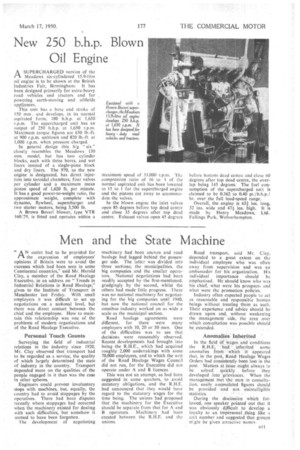Men and the State Machine
Page 45

If you've noticed an error in this article please click here to report it so we can fix it.
A N outlet had to be provided for
r't the expression of employees' opinions if Britain were to avoid the excesses which had been seen in some Continental countries," said Mr. Harold Clay, a member of the Road Haulage Executive, M an address on "Trends in industrial Relations in Road Haulage," given to the Institute of Transport in Manchester last Friday. With, small employers it was difficult to set up negotiations on a national level, but ' there was direct contact between the chief and the employee. How to maintain this relationship was one of the problems of modem organizations and of the Road Haulage Executive.
Personal Touch Counts Surveying the field of industrial relations in the industry since 1920, Mr. Clay observed thattransport had to be regarded as a service, the quality of which largely determined the. state of industry in the country. transport depended more on the qualities of the people engaged in it than was the case in other spheres.
Engineers could prevent involuntary stops with machines, but, equally, the country had to avoid stoppages by the operatives. There had been disputes recently where stoppages had occurred when the machinery existed for dealing with such difficulties, but somehow it seemed to have been forgotten.
The development of negotiating machinery had been uneven and road haulage had lagged behind the passenger side. The latter was divided into
• three seams; the municipalities, the big companies and the smaller operators. National negotiations had been readily accepted by the first-mentioned, grudgingly by the second, whilst the others had made little progress. There was no national machinery for negotiating for the big companies until 1940, but now the national council for the omnibus industry worked on as wide a scale as the municipal section.
Road haulage agreements were different, for there were many employers with 10, 20 or 50 men. One of the difficulties was to see that decisions were reasonably observed. Recent developments had brought into being the R.H.E., which had acquired roughly 2,000 undertakings with some 70,000 employees, and to which the writ of the Road Haulage Wages Council did not run, for the Executive did not operate under A and B licences
This was not an attempt, as had been suggested in sonic quarters, to avoid statutory obligations, and the R.H.E. had announced that they would have regard to the statutory wages for the time being. The unions had proposed that the machinery for the Executive should be separate from that for A and B operators. Machinery had been created .between the R.H.E. and the unions.
Road transport,. said Mr. Clay, depended to a great extent on the individual employee who was often away from supervision and was an ambassador for his organization. His individual • importance should be emphaSized. He should know who was his chief, what were his prospects and what were the promotion policies.
Industry often expected people to act as reasonable and responsible human beings without treating them as such. Their experience and advice should be drawn upon and, without weakening the managementside,the areaover which consultation was possible should he extended, Anomalies Inherited
In the field of wages and conditions the R.H.E. had inherited some anomalies from which it appeared that, in the past, Road Haulage Wages Orders had consistently been lost in the post. Matters at issue ought always to be solved qukkly before they developed into grievances. When the management met the men in consultation, easily assimulated figures should be provided and notunintelligible statistics.
During the discussion which followed, one speaker pointed out that it was obviously difficult to develop a loyalty to an impersonal .thing like a unit number and suggested that groups might be given attractive names




























































































